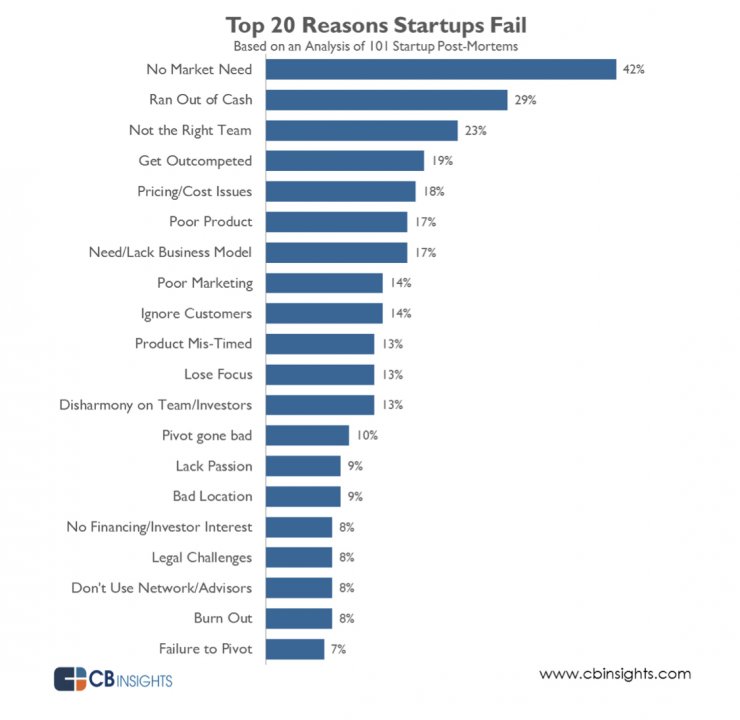One of the best ways to learn how to do something well…
… is to understand how it goes wrong.
This is why chess Grandmasters actually tend to spend more time analyzing games than playing them.
So, what are the mistakes people typically make in small business, and what can we learn from them?

Image: CBinsights.com
1. No market need – doesn’t matter if it’s great if nobody wants it

Image: Matthew Henry
This is the #1 reason why startups fail, and it’s a rather painful one. It’s also very avoidable.
Entrepreneurs are fundamentally optimistic people who believe that they can succeed where others have failed. This is a useful trait to have when building a business. But it can also be a liability if you’re not careful.
The challenge is to ground your optimism in reality.
Lesson: Do your market research before your take the leap. Before you put down the payment for rent, make sure that ordinary people are eager and willing to pay for the product that you’re selling.
2. Mismanaging finances: running out of money = death

Image: Matthew Henry
Kongō Gumi, a Japanese construction company, was once the oldest business of all time, dating back to the year 578. It had a good run for over 1,400 years, but ultimately failed because… it ran out of money.
Finances are the lifeblood of every business, both big and small. If you have money, you’re still in the game and you can play another round. If you don’t, you’re out.
Lesson: Never let yourself get sloppy about money. You want to make sure that you’re always able to make payroll for your team.
3. Lack of marketing – a great product that nobody knows or cares about
Sometimes professional craftsmen start up small businesses because they know they’re really good at making what they make – whether it’s a great meal or a beautiful product.
But when opening day comes, hardly anybody knows about the store. There’s barely any walk-in traffic. Nobody knows about the business, and so it flounders.

GoPro on the left, Contour on the right. (Image: TheCamCritic)
Have you ever heard of Contour? It was a strong competitor of GoPro’s, even getting better reviews from serious enthusiasts.
But by Marc Barros’s own admission (Contour’s founder), Contour lost because GoPro had superior marketing.
Lesson: No matter how good you are, you want to make sure that you’re telling people about your business. Build up some hype before you even launch your business. Talk to the press. Talk to influencers.
4. An underwhelming customer experience – if your customers aren’t happy, your bottom line won’t be either
Lots of things have been digitized and automated, making it easier than ever to run many different parts of a small business out of your phone.
But if there’s one thing that’s still unchanged for thousands of years, it’s the fundamental nature of customer service.

Some of the oldest written records we have are basically bad Yelp reviews from 4,000 years ago.
The absolute best of the best might be able to get away with being gruff and unpleasant towards their customers (think Seinfeld’s No Soup For You!), but normal people are going to have to make good service a part of their business offering.
Nobody really thinks that Starbucks serves incredible coffee. They go there because they have an expectation of a reliable threshold of service and consistency.
Lesson: Happy customers keep your business alive. Unhappy customers can ruin it. Make sure you keep your customers happy. Talk to them.
5. Lack of focus – you have to do one thing better than everyone else, or you’ll likely lose

Image: Matthew Henry
This is one of those things that can sound silly when you read about it…
… and yet it’s really easy to have it happen to you.
When you’re running a business, you’re always going to have dozens if not hundreds of things to worry about all at once.
You have to worry about suppliers, about rent, about quality control, about hiring, about what your competitors are doing.
There’s just so much to do. Your todo list is pretty much infinite.
Despite all of this, the most important thing that you can do… is focus on your most important thing.
Focus is how startups manage to take down much larger, much better-funded incumbents.
Lesson: No matter how many things there are on your plate, take the time to figure out what your most important priorities are, and then work on the top priorities.


